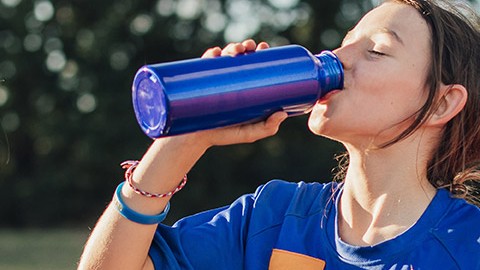What is the WHO Code?
The International Code of Marketing of Breast-milk Substitutes is a set of recommendations for member states of the World Health Organization (WHO) designed to regulate the marketing of breast milk substitutes, feeding bottles and teats. It is referred to as the ‘WHO Code’.
It was introduced in 1981 in response to the concerns being raised about the marketing of breast milk substitutes in developing countries.
How was it created?
The WHO Code was adopted as a resolution by the World Health Assembly (WHA), the decision making body of the WHO, in May 1981. This followed extensive consultation with key stakeholders - including governments, United Nations agencies, civil society and infant food manufacturers.
Why was the Code introduced?
The Code aims to contribute ‘to the provision of safe and adequate nutrition for infants, by the protection and promotion of breastfeeding, and by ensuring the proper use of breast-milk substitutes, when these are necessary, on the basis of adequate information and through appropriate marketing and distribution’.
It is important to note that the Code recognises that breast milk substitutes have a legitimate role to play in circumstances where an infant is not breastfed.
Is the WHO Code an international law?
No. The Code is a set of recommendations to member states of the WHO.
It states governments should take action to give effect to its aim and principles, through legislation or other means.
How has Nestlé changed its marketing practices since the Code was adopted?
We’ve learnt a great deal from our experiences, and we recognise our responsibility to go beyond what were common marketing standards in the past. We strive to continuously improve our practices and our efforts have been recognised externally. We are proud to have been the first Breastmilk Substitutes (BMS) manufacturer included in the FTSE4Good Index and to have consistently met its rigorous criteria for the responsible marketing of BMS since 2011.
Alongside the Access to Nutrition Index (ATNI), FTSE4Good is the only other independent, transparent, third-party assessing marketing practices of Breastmilk Substitutes (BMS). Read more about FTSE4Good.
Does Nestlé follow the WHO Code?
The WHO has consistently clarified that governments have the responsibility for defining implementation of the Code within their countries. Therefore, we follow the WHO Code as implemented by national governments everywhere in the world.
In 152 countries that are considered to be higher risk in terms of infant mortality and malnutrition, we follow our own stringent policy (pdf, 5Mb) drawn from the WHO Code, or national regulations, whichever is stricter.
This is necessary because many ‘higher risk’ countries have not fully implemented the Code. In fact, according to a recent WHO report (pdf, 587Kb), only 37 out of 199 member states had passed laws reflecting all its recommendations and subsequent resolutions as of 2011.
What is meant by ‘higher-risk’ country?
Countries are classed as higher-risk by the FTSE4Good Breast Milk Substitutes Marketing Criteria when they have high rates of mortality (more than 10 per 1,000) or acute malnutrition (more than 2%) in children under five. This is based on data from UNICEF.
What is the difference between Nestlé's policy and the WHO Code?
The WHO Code is a set of recommendations for member states. The WHO has consistently clarified that it is up to governments to define how to implement the code in their countries.
Our policy (pdf, 5Mb) is a set of detailed implementation instructions to our infant nutrition marketing and sales staff. It explains concretely what can and can’t be done against each article of the Code. It was first drawn up in 1982 and then refined in 1984 after consultations with stakeholders including the WHO, the United Nations Children’s Fund (UNICEF) and civil society organisations. Since then it has been revised and strengthened a number of times.
Our policy is in line with the FTSE4Good Inclusion Criteria for the Marketing of Breast Milk Substitutes.
What are the Nestlé products covered by the Nestle policy?
Our policy applies to the marketing of all products specified in local legislation implementing the WHO Code.
In higher-risk countries, this policy applies to all infant and follow-up formulas designed to satisfy the nutritional requirements of infants from birth to 12 months, including infant and follow-up formulas classified as Food for Special Medical Purposes (iFSMPs) under local legislation and which fall within the following product range:
- infant formula for the reduction of the risk of allergy "HA" branded (or equivalent)
- infant formula for constipation relief
- infant formula for low hygiene conditions
Are Nestlé's marketing practices independently assessed?
Yes. As part of a continuous assessment process, Bureau Veritas audits our practices in three different countries every year against our policy (pdf, 5Mb).
In addition, PricewaterhouseCoopers (PwC) is commissioned by FTSE4Good to independently and regularly verify our breast milk substitutes marketing practices against a set of 104 criteria in higher-risk countries.
Do you donate infant formula during crises?
Breastmilk is the ideal food for infants. For infants who cannot be fed on breast milk as recommended, infant formula is the only suitable breastmilk substitute recognized as appropriate by the WHO.
Nestlé recognizes the heightened health risks for babies that are not breastfed in emergency circumstances. Our standard for donations (pdf, 500Kb) aims to both protect breastfeeding and respond to humanitarian requests.
Where permitted by national legislation and when specific criteria are met, we may donate limited quantities of infant formula to humanitarian organizations for babies who need to be fed breastmilk substitutes. This is only provided in response to official requests and through an organization which is authorized to distribute formula, safely and appropriately, and is strictly monitored. In no instance should any formula be delivered directly to mothers or caregivers.
Find out more
- Read more about our compliance record, including the Bureau Veritas Assurance Statements
- Read the PwC Independent Assessment report
- Read our Policy on the implementation of the WHO International Code of marketing of breast milk substitutes (pdf, 53Kb)
- Read more about Nestlé for Healthier Kids
- Read more about FTSE4Good
- Read more about the Nestlé boycott
Related documents
- International Code of Marketing of Breast-Milk Substitutes (who.int)
- Nestlé Global Parental Support Policy (pdf, 2Mb)
- Nestlé Policy on the implementation of the WHO International Code of marketing of breast milk substitutes (pdf, 5Mb)
- Guideline: Sponsorship of Health Workers and Institutions for Professional Development and Scientific Research (pdf, 2Mb)
- Standard for Donations or Low-Cost Supplies for use in Emergencies and for Social Purposes (pdf, 3Mb)
Raising a concern
It is our strong commitment to market our infant food products in accordance with the principles and aim of the WHO Code. To find out more about how you can raise a concern, visit this page.







